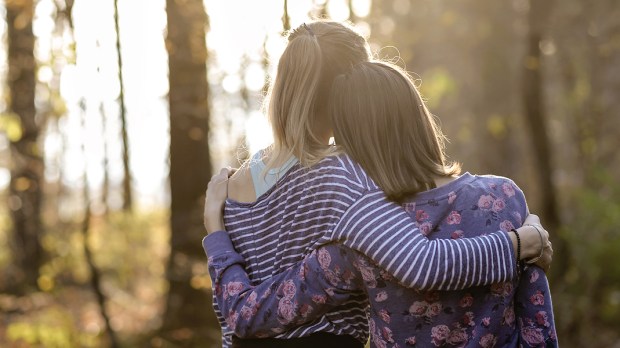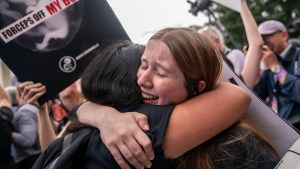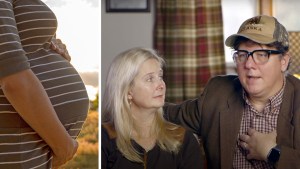Emily Johnston wants pro-lifers to know what women considering abortion truly need after the Dobbs Supreme Court decision overturned Roe v. Wade.
She should know. She personally mentored Katie and 14 other pregnant women and has helped, directly or indirectly, hundreds more choose life at pregnancy resource centers.
And Emily told me something else about herself that she said she wants to say publicly for the first time. She has herself had two abortions. When I asked the ages of her children, she told me about the three little ones at home — and the two older ones who are gone.
“It’s hard watching Roe v. Wade being overturned and anything in the news that has to do with abortion,” Emily Johnston told me. “Seeing the backlash from pro-choicers is incredibly triggering. It is basically telling me that my babies’ lives don’t matter.”
“The first abortion was when I was 18,” she said. The choice took her by surprise.
One day she was doodling baby names on a piece of paper. The next day she walked into her parents’ bedroom and called Planned Parenthood.
“I used to go to the abortion clinics and pray outside of them in high school,” she said. “It was crazy that now I was the girl who walked in. I was fully going to keep the baby, but fear is a really crazy thing.”
I was fully going to keep the baby, but fear is a really crazy thing.”
She described the fear by saying, “The thought that I was having a baby was totally erased from my mind. I just felt numb from all the things people were telling me — I would never go to college. My life is going to be ruined. After a certain point, you give in to it.”
The clinic booked her right away and she had the abortion the day after she called.
“It was the worse experience of my life,” she said. “Everything you hear about those clinics is 100% true. When you’re done you’re in a room on recliners with girls who have just done the same thing, and everyone just looks down in shame.”
The shame lasted, she said — and the witness of some pro-lifers didn’t help.
“My feeling for the first 24 hours was relief — and then shame,” Emily said.
After she got pregnant, her pro-life friends were part of the problem. “There was a lot of gossip and a lot of mean things said. Instead of lifting me up it was really tearing me down,” she said. “I know now from working with women who are abortion-minded that if you tear them down and make them feel shame, that is not going to help them choose life.”
Seeing a priest at the abortion clinic holding a sign that said “Abortion Is Murder” didn’t help.
“There was shame in being pregnant, shame in aborting. It was a terrible, terrible decision and it led to me feeling like I’ve committed this terrible sin and there was no help,” she said. It led her to more bad decisions and another abortion — this time with pills, an experience as bad as the first, she said.
“It was right after that that I realized ‘Okay, I’ve killed two of my children. What am I doing?” she said.
Visiting her sister Sharon’s family, regulars at the March for Life, helped.
“I saw how pro-life they were. They had the signs and everything,” she said. One sign says “Your mom chose LIFE” in big bright letters with a stick-figure drawing of a family. “It was in my face. I’m grateful now. It’s important to see the truth of what we did and bring it to Jesus and that’s not going to happen if you are never confronted.”
Emily got married and had children, but the shame lingered. “It was really hard to go through pregnancy,” she said. “When they were born, and I was holding them, I couldn’t enjoy being a new mom because I was holding on to the guilt of my first two babies.”
She finally admitted what she had done to Sharon. “She was the first person to tell me I could take it to the Lord and he wanted to forgive me. I thought there was no way. I felt like this was the type of sin that you go straight to hell with.”
That Christmas she went to confession for the first time in many years, to the priest at Sharon’s parish. “I told him everything and it took a long time,” she said. “There was a lot to confess.”
After that, Emily’s new story started.
Back in Texas, she volunteered with the secular pro-life center Let Them Live, eventually becoming counseling manager.
“I can talk to people and tell them, ‘I’ve been there,’” she said. Sometimes, convincing a woman not to have an abortion is as simple as paying their bills.
“Abortion is fear-based,” said Emily. “Whether they are someone from a relatively well-off family or someone who has no money or someone who is with a bad guy — break down the fear and women no longer think they have to abort.”
Pro-life work is hard, but worth it. “It’s very emotionally draining to work with these women,” she said. “My husband would ask me ‘Are you going to be able to do this every day?’ These are hard, hard situations.”
Katie, one of the women Emily helped, is an extremely important voice for the pro-life movement to hear.
“I had a bad experience with pro-life organizations,” Katie told me. “They didn’t care about the woman. They should care more about the woman, versus just telling you to choose life.”
She had had an abortion before because, financially, she felt “I had no choice.” When her boyfriend left her and her 5-year-old child when she was pregnant again, she called several pregnancy centers and got only talking points and lists of phone numbers.
She was scheduled to abort her child the day Emily called.
“She told me her story and she said, ‘I am going to be with you throughout the entire pregnancy.’ And she was with me every day, finding jobs, getting assistance. She was the emotional support I needed,” said Katie. She laughed, “Then it turned out Emily was pregnant too. We were pregnant together.”
Emily told me that she did for Katie what she wished others had done for her. “I’m a really big believer in understanding that circumstances change. Mine did.”
What can the pro-life movement do now that Roe v. Wade has been overturned? Love more, said Emily.
“What I have seen is nothing but absolute love from the pro-life movement,” she said. “Every single person I’ve worked with is on fire to help women.”
Every pregnant woman in trouble is asking the same question of pro-lifers, she said. “’Once you convince me to keep my baby are you going to leave?’ That’s the argument from pro-choicers, that we leave. And we need to show everybody that we’re not going to leave.”
Emily is now helping advise and promote Fortress for Her, a Christ-centered apostolate that offers the chance to share the faith with women too.
“That’s one of the biggest things. You can have a mom save her baby and that’s enormous, but without the Lord, lives are just not being changed,” she said. “I know I’m forgiven and that’s a huge comfort.”
“But,” she added, thinking of her two oldest children, “it’s still hard to watch my children playing sometimes.”




